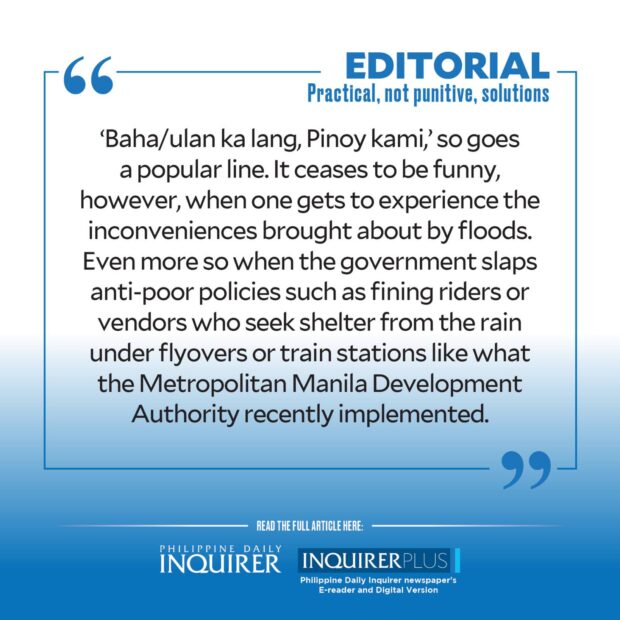Scrolling through the #raininginManila trend on various social media platforms reveals the creative and humorous ways Filipinos cope with disasters. One popular line, “Baha/ulan ka lang, Pinoy kami,” showcases this humor. However, the inconveniences caused by floods make it less amusing. What’s even more disheartening is the implementation of anti-poor policies by the government, such as fining riders and vendors seeking shelter from the rain under flyovers or train stations, as recently announced by the Metropolitan Manila Development Authority (MMDA). Under this policy, riders taking shelter under underpasses and flyovers during downpours will be issued traffic violation tickets and fined P1,000 for obstruction.
Rider Party List Rep. Bonifacio Bosita immediately criticized this policy, deeming it inhumane and dangerous for riders. Bosita said, “Instead of finding a solution to the problem, they are putting the lives of riders in peril and even collecting a huge fine from them.” In response, MMDA stated that it has requested gasoline station operators to install tents in their Edsa stations to serve as shelter for riders. However, this forces riders to continue on the road, despite the dangers, until they reach the nearest gas station. Bosita argues that there is enough space for temporary shelter under these structures without obstructing other motorists and pedestrians. Additionally, the proposal raises concerns about MMDA offloading the burden onto private gasoline stations. Considering MMDA’s substantial budget, why can’t they construct these temporary shelters for motorists along major thoroughfares instead? Perhaps MMDA needs a reminder of its mandate to deliver metro-wide services, including the management of transport, traffic, and public safety.
But let’s not pretend to be surprised by these anti-poor policies. There are several examples of such policies that target the less fortunate. For instance, new driver’s license applicants are required to enroll in an accredited driving school that charges P5,000 and above, while renewal applicants must pay P500 for a vision test. Government offices also impose a dress code, discriminating against those who cannot afford proper attire. The proposed Open Door Policy Act aims to ensure equal access to public service regardless of attire. Furthermore, drivers and operators already struggling financially are forced to spend at least P2 million on an e-jeepney. To add to commuters’ burdens, the “rush hour surcharge” aims to help jeepney and bus drivers cope with rising fuel costs. The Land Transportation Franchising and Regulatory Board is reviewing a petition to impose this surcharge. If approved, P1 will be added to the jeepney base fare and P2 to the city bus fare during peak hours on weekdays and Saturdays. However, many, including Muntinlupa Mayor Ruffy Biazon, criticize this measure, highlighting its negative impact on low-wage workers and questioning how much rest they will have.
These policies fail to address the root of the problem: a broken public transport system. Transportation is a sensitive issue for most Filipinos who face the dehumanizing experience of commuting with limited options and a lack of last-mile connectivity. Social media responses to these policies range from frustration to disappointment, with comments such as “Government officials should try commuting first” and “Why punish commuters and taxpayers?” The government only offers temporary solutions that disproportionately affect marginalized sectors. Instead of passing on the rush hour surcharge to commuters under the guise of helping jeepney and bus drivers, why not impose it on all road users? Smart cities like Singapore implement electronic road pricing, which sets rates based on location, time of day, vehicle type, and real-time speeds to reduce traffic in congested areas. Other cities promote telecommuting or work-from-home arrangements and encourage public transport, walking, and cycling. These practical approaches can greatly benefit a country where only 6 percent of the population owns cars.
Unfortunately, the government prioritizes widening roads to accommodate more vehicles rather than creating a safe road environment for the majority who rely on public transport or walk and bike to work. Why does the government favor punitive measures over practical and sustainable solutions that would enhance the lives of Filipinos and make everyday tasks easier?
Subscription couldn’t be saved. Please try again.
Subscription successful.
Read Next
Don’t miss out on the latest news and information. Subscribe to INQUIRER PLUS to access The Philippine Daily Inquirer and over 70 other titles. With a subscription, you can share up to 5 devices, listen to the news, download articles as early as 4 AM, and share them on social media. Call 896 6000 for more information. For feedback, complaints, or inquiries, contact us.
[HTML tags have been preserved]
Denial of responsibility! VigourTimes is an automatic aggregator of Global media. In each content, the hyperlink to the primary source is specified. All trademarks belong to their rightful owners, and all materials to their authors. For any complaint, please reach us at – [email protected]. We will take necessary action within 24 hours.


